网络流行语英文
- 格式:pptx
- 大小:5.14 MB
- 文档页数:14
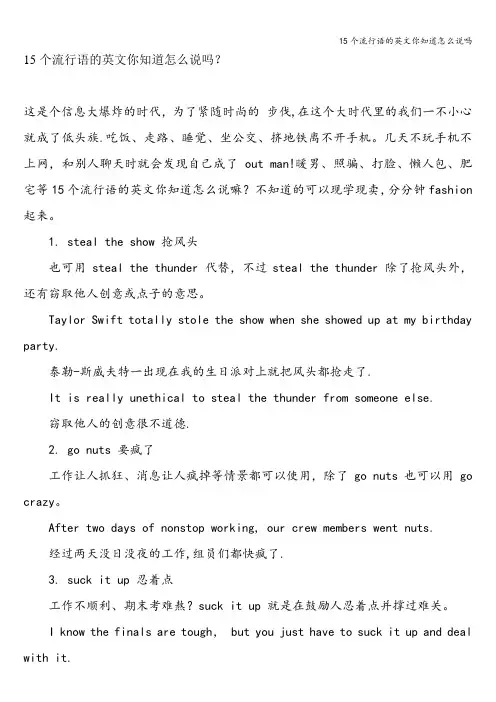
15个流行语的英文你知道怎么说吗?这是个信息大爆炸的时代,为了紧随时尚的步伐,在这个大时代里的我们一不小心就成了低头族.吃饭、走路、睡觉、坐公交、挤地铁离不开手机。
几天不玩手机不上网,和别人聊天时就会发现自己成了 out man!暖男、照骗、打脸、懒人包、肥宅等15个流行语的英文你知道怎么说嘛?不知道的可以现学现卖,分分钟fashion 起来。
1. steal the show 抢风头也可用 steal the thunder 代替,不过steal the thunder 除了抢风头外,还有窃取他人创意或点子的意思。
Taylor Swift totally stole the show when she showed up at my birthday party.泰勒-斯威夫特一出现在我的生日派对上就把风头都抢走了.It is really unethical to steal the thunder from someone else.窃取他人的创意很不道德.2. go nuts 要疯了工作让人抓狂、消息让人疯掉等情景都可以使用,除了go nuts也可以用 go crazy。
After two days of nonstop working, our crew members went nuts.经过两天没日没夜的工作,组员们都快疯了.3. suck it up 忍着点工作不顺利、期末考难熬?suck it up 就是在鼓励人忍着点并撑过难关。
I know the finals are tough, but you just have to suck it up and deal with it.我知道期末考很不容易,但你就忍着点撑过去吧。
4。
slap in the face 打脸“打脸”一词其实很早就有了,今年特别流行,意思是找出别人的错事儿而使之丢脸出糗。
The mayor promised that he will finish his term, so it was a slap in the face when he announced to run for president。
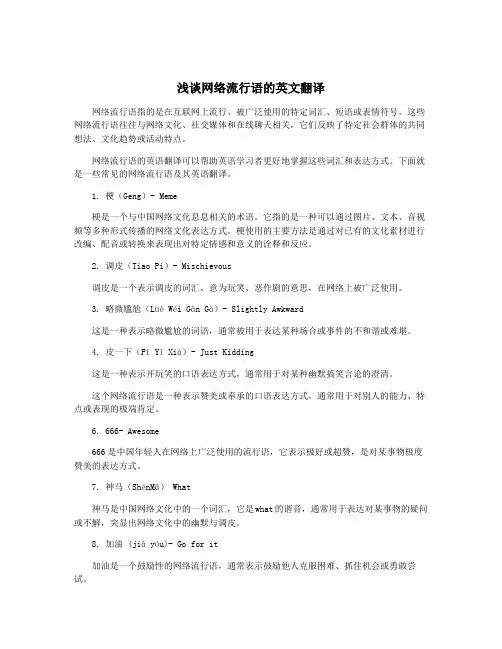
浅谈网络流行语的英文翻译网络流行语指的是在互联网上流行、被广泛使用的特定词汇、短语或表情符号。
这些网络流行语往往与网络文化、社交媒体和在线聊天相关,它们反映了特定社会群体的共同想法、文化趋势或活动特点。
网络流行语的英语翻译可以帮助英语学习者更好地掌握这些词汇和表达方式。
下面就是一些常见的网络流行语及其英语翻译。
1. 梗(Geng)- Meme梗是一个与中国网络文化息息相关的术语。
它指的是一种可以通过图片、文本、音视频等多种形式传播的网络文化表达方式。
梗使用的主要方法是通过对已有的文化素材进行改编、配音或转换来表现出对特定情感和意义的诠释和反应。
2. 调皮(Tiao Pi)- Mischievous调皮是一个表示调皮的词汇,意为玩笑、恶作剧的意思,在网络上被广泛使用。
3. 略微尴尬(Lüè Wéi Gān Gà)- Slightly Awkward这是一种表示略微尴尬的词语,通常被用于表达某种场合或事件的不和谐或难堪。
4. 皮一下(Pí Yī Xià)- Just Kidding这是一种表示开玩笑的口语表达方式,通常用于对某种幽默搞笑言论的澄清。
这个网络流行语是一种表示赞美或奉承的口语表达方式,通常用于对别人的能力、特点或表现的极端肯定。
6. 666- Awesome666是中国年轻人在网络上广泛使用的流行语,它表示极好或超赞,是对某事物极度赞美的表达方式。
7. 神马(ShénMǎ) What神马是中国网络文化中的一个词汇,它是what的谐音,通常用于表达对某事物的疑问或不解,突显出网络文化中的幽默与调皮。
8. 加油(jiā yóu)- Go for it加油是一个鼓励性的网络流行语,通常表示鼓励他人克服困难、抓住机会或勇敢尝试。
9. 方便面( Fāngbiànmiàn) – Instant Noodles方便面是网络流行语,表示解决问题或商讨问题的速度极快的表述方式。
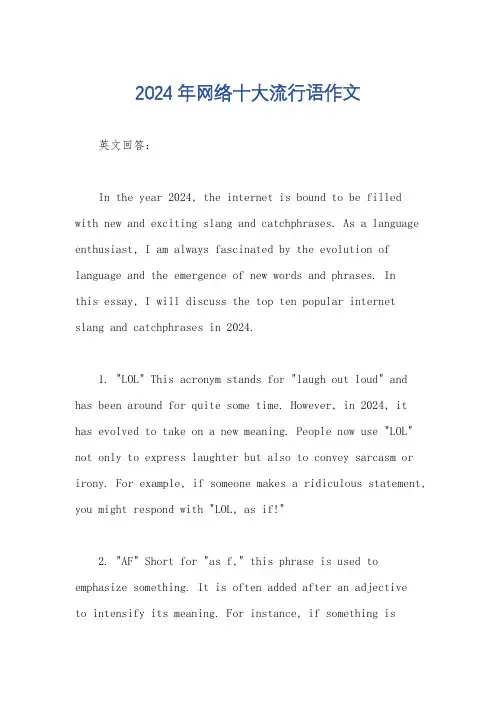
2024年网络十大流行语作文英文回答:In the year 2024, the internet is bound to be filledwith new and exciting slang and catchphrases. As a language enthusiast, I am always fascinated by the evolution of language and the emergence of new words and phrases. Inthis essay, I will discuss the top ten popular internet slang and catchphrases in 2024.1. "LOL" This acronym stands for "laugh out loud" and has been around for quite some time. However, in 2024, it has evolved to take on a new meaning. People now use "LOL" not only to express laughter but also to convey sarcasm or irony. For example, if someone makes a ridiculous statement, you might respond with "LOL, as if!"2. "AF" Short for "as f," this phrase is used to emphasize something. It is often added after an adjectiveto intensify its meaning. For instance, if something isextremely funny, you could say "That joke was hilariousAF!"3. "Savage" This term is used to describe someone who is brutally honest or has a cutting sense of humor. It is often used in a positive way to praise someone's wit or cleverness. For example, if someone delivers a clever comeback, you might say, "Wow, that was savage!"4. "FOMO" This acronym stands for "fear of missing out" and is used to describe the anxiety or uneasiness one feels when they think they are missing out on an exciting or interesting event. For instance, if you see your friends having a great time at a party and you couldn't attend, you might say, "I have serious FOMO right now!"5. "YOLO" Short for "you only live once," this phrase is used to encourage people to take risks and live life to the fullest. It is often used as a justification for doing something adventurous or spontaneous. For example, if someone suggests going on a spontaneous road trip, you might respond with "YOLO, let's do it!"6. "Ghosting" This term refers to the act of suddenly ending all communication with someone, especially in the context of dating or relationships. It is often done without any explanation or warning. For instance, if someone stops responding to your messages and disappears without a trace, you might say, "I can't believe he ghosted me!"7. "Facepalm" This term is used to express frustration or disappointment in someone's actions or words. It is often accompanied by a physical gesture of placing one's hand on the face. For example, if someone says something incredibly foolish, you might respond with a facepalm and say, "I can't believe you just said that!"8. "Lit" This term is used to describe something that is exciting, enjoyable, or impressive. It is often used to describe parties, events, or experiences. For instance, if you attend a concert and have an amazing time, you might say, "That concert was lit!"9. "Throw shade" This phrase is used to subtly insult or criticize someone. It is often done in a sly or indirect manner. For example, if someone makes a snide remark about your outfit, you might respond by throwing shade back at them.10. "Binge-watch" This term refers to the act of watching multiple episodes of a TV show or an entire season in one sitting. It has become increasingly popular with the rise of streaming platforms. For instance, if you spend an entire weekend watching a new series, you might say, "Ijust binge-watched the entire season!"中文回答:2024年,网络上必然充斥着新奇有趣的流行语和口头禅。
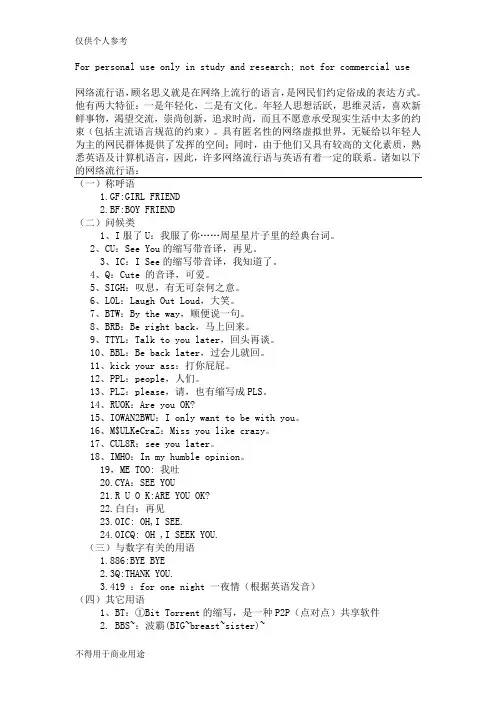
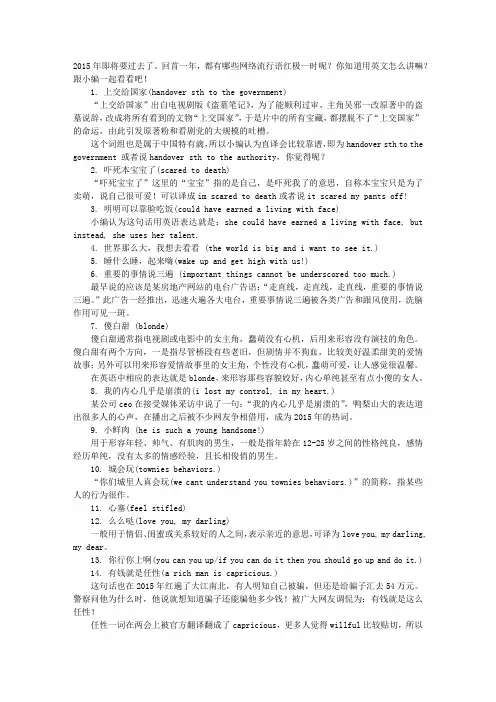
2015年即将要过去了。
回首一年,都有哪些网络流行语红极一时呢?你知道用英文怎么讲嘛?跟小编一起看看吧!1. 上交给国家(handover sth to the government)“上交给国家”出自电视剧版《盗墓笔记》,为了能顺利过审,主角吴邪一改原著中的盗墓说辞,改成将所有看到的文物“上交国家”,于是片中的所有宝藏,都摆脱不了“上交国家”的命运,由此引发原著粉和看剧党的大规模的吐槽。
这个词组也是属于中国特有滴,所以小编认为直译会比较靠谱,即为handover sth to the government 或者说handover sth to the authority,你觉得呢?2. 吓死本宝宝了(scared to death)“吓死宝宝了”这里的“宝宝”指的是自己,是吓死我了的意思,自称本宝宝只是为了卖萌,说自己很可爱!可以译成im scared to death或者说it scared my pants off!3. 明明可以靠脸吃饭(could have earned a living with face)小编认为这句话用英语表达就是:she could have earned a living with face, but instead, she uses her talent.4. 世界那么大,我想去看看 (the world is big and i want to see it.)5. 睡什么睡,起来嗨(wake up and get high with us!)6. 重要的事情说三遍 (important things cannot be underscored too much.)最早说的应该是某房地产网站的电台广告语:“走直线,走直线,走直线,重要的事情说三遍。
”此广告一经推出,迅速火遍各大电台,重要事情说三遍被各类广告和跟风使用,洗脑作用可见一斑。
7. 傻白甜 (blonde)傻白甜通常指电视剧或电影中的女主角,蠢萌没有心机,后用来形容没有演技的角色。
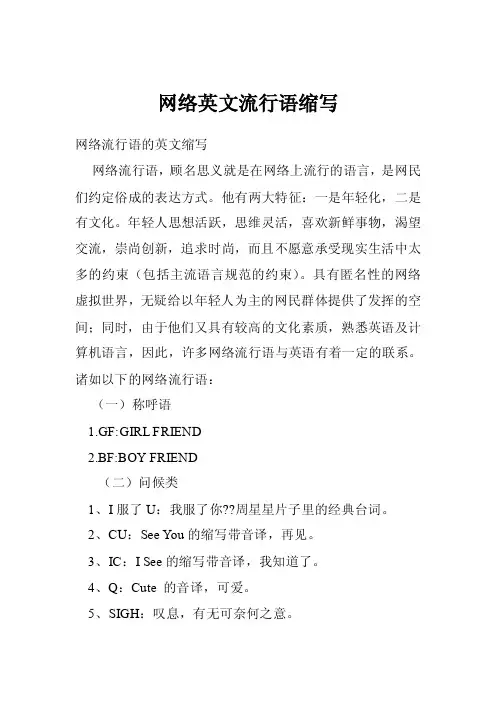
网络英文流行语缩写网络流行语的英文缩写网络流行语,顾名思义就是在网络上流行的语言,是网民们约定俗成的表达方式。
他有两大特征:一是年轻化,二是有文化。
年轻人思想活跃,思维灵活,喜欢新鲜事物,渴望交流,崇尚创新,追求时尚,而且不愿意承受现实生活中太多的约束(包括主流语言规范的约束)。
具有匿名性的网络虚拟世界,无疑给以年轻人为主的网民群体提供了发挥的空间;同时,由于他们又具有较高的文化素质,熟悉英语及计算机语言,因此,许多网络流行语与英语有着一定的联系。
诸如以下的网络流行语:(一)称呼语1.GF:GIRL FRIEND2.BF:BOY FRIEND(二)问候类1、I服了U:我服了你??周星星片子里的经典台词。
2、CU:See You的缩写带音译,再见。
3、IC:I See的缩写带音译,我知道了。
4、Q:Cute 的音译,可爱。
5、SIGH:叹息,有无可奈何之意。
6、LOL:Laugh Out Loud,大笑。
7、BTW:By the way,顺便说一句。
8、BRB:Be right back,马上回来。
9、TTYL:Talk to you later,回头再谈。
10、BBL:Be back later,过会儿就回。
11、kick your ass:打你屁屁。
12、PPL:people,人们。
13、PLZ:please,请,也有缩写成PLS。
14、RUOK:Are you OK?15、IOWAN2BWU:I only want to be with you。
16、M$ULKeCraZ:Miss you like crazy。
17、CUL8R:see you later。
18、IMHO:In my humble opinion。
19,ME TOO: 我吐20.CYA:SEE YOU21.R U O K:ARE YOU OK?22.白白:再见23.OIC: OH,I SEE.24.OICQ: OH ,I SEEK YOU.(三)与数字有关的用语1.886:BYE BYE2.3Q:THANK YOU.3.419 :for one night 一夜情(根据英语发音)(四)其它用语1、BT:①Bit Torrent的缩写,是一种P2P(点对点)共享软件2. BBS~:波霸(BIG~breast~sister)~3、SOHO:Small Office Home Officer的简称,意思是:在家办公。

emo作为一个网络流行语,现在用来表示人的负面情绪状态,例如抑郁、不开心、悲伤、失落等。
也可以将“emo”解释为英文emotional(情感的,情绪激动的)的缩写。
在悲伤的基调下,一切的情绪不稳定皆可“emo”
例如:“我emo了”意在表达一种颓废、低落、不开心的情绪,是一种间接性的失落情绪的表达。
emo起源:
emo原本是一种情绪化的音乐风格,但在互联网上,逐渐的衍生出“丧”“忧郁”“伤感”等多重含义。
从上世纪90年代末00年代初开始,“emo”就已经存在。
只不过,在那个时间段,“emo”指代的含义还比较单一,是emocore的简写,全称是Emotional Hardcore,即情绪硬核或情绪化硬核。
2000年后,“emo”文化传入日本、中国,并风靡一时,影响着当时的年轻人。
大众所熟知的“杀马特”,就是“emo”的本土化产物。
此后一段时间,中国国内外的“emo”风陷入沉寂。
2021年,在各种因素的影响下,“emo”再次受到关注,并成为当代青年人所谓的“丧”文化的一种标签。
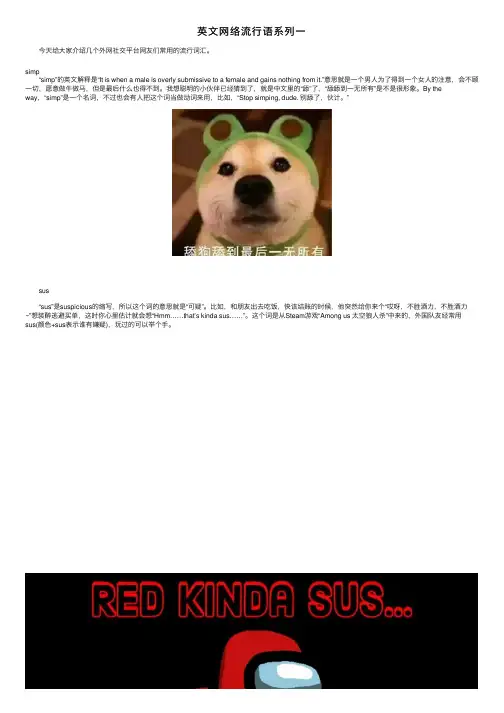
英⽂⽹络流⾏语系列⼀
今天给⼤家介绍⼏个外⽹社交平台⽹友们常⽤的流⾏词汇。
simp
“simp”的英⽂解释是“It is when a male is overly submissive to a female and gains nothing from it.”意思就是⼀个男⼈为了得到⼀个⼥⼈的注意,会不顾⼀切,愿意做⽜做马,但是最后什么也得不到。
我想聪明的⼩伙伴已经猜到了,就是中⽂⾥的“舔”了,“舔舔到⼀⽆所有”是不是很形象。
By the
way,“simp”是⼀个名词,不过也会有⼈把这个词当做动词来⽤,⽐如,“Stop simping, dude. 别舔了,伙计。
”
sus
“sus”是suspicious的缩写,所以这个词的意思就是“可疑”。
⽐如,和朋友出去吃饭,快该结账的时候,他突然给你来个“哎呀,不胜酒⼒,不胜酒⼒~”想装醉逃避买单,这时你⼼⾥估计就会想“Hmm……that’s kinda sus……”。
这个词是从Steam游戏“Among us 太空狼⼈杀”中来的,外国队友经常⽤
sus(颜⾊+sus表⽰谁有嫌疑),玩过的可以举个⼿。
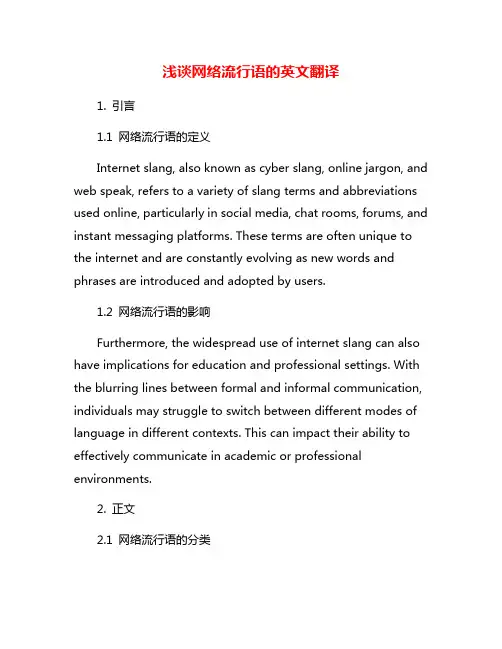
浅谈网络流行语的英文翻译1. 引言1.1 网络流行语的定义Internet slang, also known as cyber slang, online jargon, and web speak, refers to a variety of slang terms and abbreviations used online, particularly in social media, chat rooms, forums, and instant messaging platforms. These terms are often unique to the internet and are constantly evolving as new words and phrases are introduced and adopted by users.1.2 网络流行语的影响Furthermore, the widespread use of internet slang can also have implications for education and professional settings. With the blurring lines between formal and informal communication, individuals may struggle to switch between different modes of language in different contexts. This can impact their ability to effectively communicate in academic or professional environments.2. 正文2.1 网络流行语的分类Network popular language can be classified into several categories based on their characteristics and usage. Some common classifications include:2.2 网络流行语的起源The origin of internet slang can be traced back to the early days of the internet, when online communication was still in its infancy. As the internet evolved and became more widespread, so too did the use of slang and jargon.2.3 网络流行语的特点Characteristics of Internet Popular VocabularyInternet popular vocabulary, as a unique form of language phenomenon in the cyberspace era, possesses distinct characteristics that distinguish it from traditional language. Some of the key features of internet popular vocabulary include:2.4 网络流行语的传播途径Network popular phrases are spread through various channels, allowing them to reach a wide audience and become widely recognized. The dissemination of these phrases can be attributed to several key pathways:2.5 网络流行语的例子In the world of Internet culture, memes and viral phrases spread like wildfire, becoming what is known as "internet slang" or "internet memes". These phrases often originate from popular culture, movies, TV shows, or even just everyday conversations. Here are some examples of popular internet slang:1. LOL - This acronym stands for "laugh out loud" and is used to express amusement or laughter in online conversations.7. AF - Abbreviation for "as f**k", used for emphasis or intensity.3. 结论3.1 网络流行语的意义The significance of internet slang lies in its ability to reflect the current trends, attitudes, and cultural norms of a particular online community. By using internet slang, individuals can feel a sense of belonging and connection to others who share the same language and understand the underlying meanings behind the words and phrases.3.2 网络流行语的发展趋势The development trend of internet popular languageNetwork popular language has become an important part of online communication, reflecting the rapid changes and trends in contemporary society. As technology continues to advance and social media platforms continue to evolve, the development of internet popular language is expected to follow several key trends in the future.3.3 网络流行语的未来In the future, the use of internet slang and memes is expected to continue to evolve and expand as technology advances. With the increasing popularity of social media platforms and the constant evolution of internet culture, new internet slang terms and memes are likely to emerge and spread rapidly.。
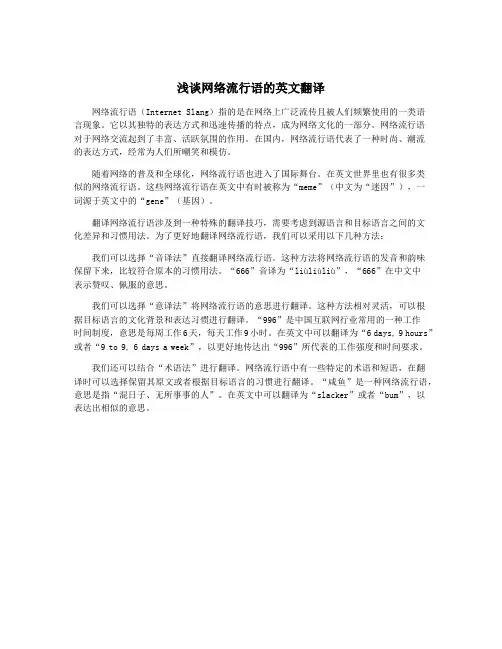
浅谈网络流行语的英文翻译网络流行语(Internet Slang)指的是在网络上广泛流传且被人们频繁使用的一类语言现象。
它以其独特的表达方式和迅速传播的特点,成为网络文化的一部分。
网络流行语对于网络交流起到了丰富、活跃氛围的作用。
在国内,网络流行语代表了一种时尚、潮流的表达方式,经常为人们所嘲笑和模仿。
随着网络的普及和全球化,网络流行语也进入了国际舞台。
在英文世界里也有很多类似的网络流行语。
这些网络流行语在英文中有时被称为“meme”(中文为“迷因”),一词源于英文中的“gene”(基因)。
翻译网络流行语涉及到一种特殊的翻译技巧,需要考虑到源语言和目标语言之间的文化差异和习惯用法。
为了更好地翻译网络流行语,我们可以采用以下几种方法:我们可以选择“音译法”直接翻译网络流行语。
这种方法将网络流行语的发音和韵味保留下来,比较符合原本的习惯用法。
“666”音译为“liùliùliù”,“666”在中文中表示赞叹、佩服的意思。
我们可以选择“意译法”将网络流行语的意思进行翻译。
这种方法相对灵活,可以根据目标语言的文化背景和表达习惯进行翻译。
“996”是中国互联网行业常用的一种工作时间制度,意思是每周工作6天,每天工作9小时。
在英文中可以翻译为“6 days, 9 hours”或者“9 to 9, 6 days a week”,以更好地传达出“996”所代表的工作强度和时间要求。
我们还可以结合“术语法”进行翻译。
网络流行语中有一些特定的术语和短语,在翻译时可以选择保留其原文或者根据目标语言的习惯进行翻译。
“咸鱼”是一种网络流行语,意思是指“混日子、无所事事的人”。
在英文中可以翻译为“slacker”或者“bum”,以表达出相似的意思。